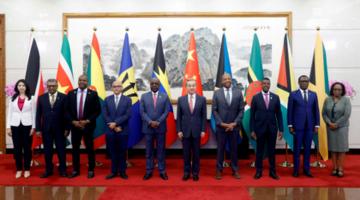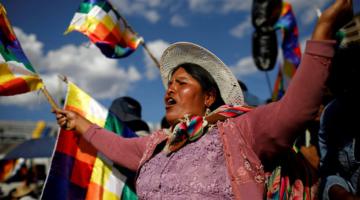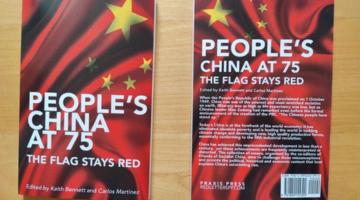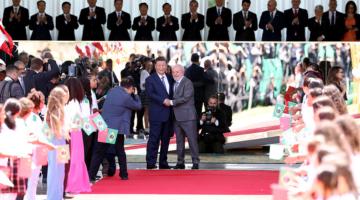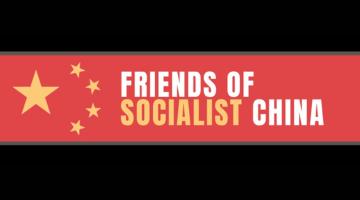Solomon Islands Prime Minister Manasseh Sogavare Meets with Chinese President Xi Jinping in October 2019 (Photo: Xinhua)
The Solomon Islands, a sovereign country in the Pacific, broke ties with Taiwan and allied with China. So the US backed a failed violent coup attempt. Australia now calls the area its “backyard,” and media moguls demand an invasion to prevent the nation from signing a security pact with Beijing.
This article originally appeared in Multipolarista.
The Solomon Islands is a sovereign nation in the Pacific, near Papua New Guinea and Australia, with a population of nearly 700,000 people (making it larger than EU/NATO member Luxembourg, NATO members Iceland and Montenegro, and EU member Malta).
As Western powers heat up their new cold war on China, they are increasingly treating the Solomon Islands as a colony, sponsoring a violent coup attempt and threatening the country for seeking to sign a security agreement with Beijing.
Top Australian government officials have referred to the sovereign nation as part of their “backyard,” and a media mogul has publicly called for the Australian military to invade and overthrow its government.
For decades, Washington used its economic leverage over the Solomon Islands to pressure the country to recognize Taiwan as an independent state.
Taiwan is part of the People’s Republic of China, a fact recognized by 93% of UN member states. Just a dozen small countries still claim it is a separate nation.
The Solomon Islands was one of them until 2019, when its democratically elected prime minister, Manasseh Sogavare, stood up to US pressure, ended diplomatic recognition of Taiwan, and formed an alliance with China.
The United States and Australia responded aggressively, seeking to sow chaos internally, and even backing a violent coup attempt in 2021.
When the central government of the Solomon Islands recognized China in 2019, the US pressured the local government in Malaita, the country’s most populous island, to reject federal policy and to maintain its ties with Taiwan.
Washington essentially bribed Malaita to continue recognizing Taiwan, pledging the province $25 million in US government aid.
Then in November 2021, violent rioters attempted to overthrow the democratically elected central government, attacking the parliament and setting fire to police stations, while also burning down Chinese businesses and assaulting ethnic Chinese.
Australia took advantage of the violence to send troops to the Solomon Islands.
Journalist Vijay Prashad noted that Washington “built a coalition of anti-communists and pro-Zionist Christians” to try to overthrow the pro-Chinese government. The flag of apartheid Israel could be seen in photos of the violent protests.
The putsch failed. But the Western efforts to destabilize the Pacific nation have continued.
This March 25, an Australian media mogul published an article openly calling on his nation’s military to invade the Solomon Islands, “capture” its islands, and “engineer regime change,” while also using “soft power” to advance Western interests.
The author, David Llewellyn-Smith, is the founding publisher and editor of the website MacroBusiness, and the founding publisher and global economy editor of the prominent political magazine The Diplomat.
Llewellyn-Smith used neocolonial rhetoric, referring to the Solomon Islands as part of Australia’s “backyard,” warning that “the CCP [Communist Party of China] occupies our backyard.”
Western governments and media pundits have ironically claimed that China is trying to turn the Solomon Islands into a puppet, while they back violent coup attempts and threaten a military invasion.
In reality, the Solomon Islands was historically colonized by the British, Germans, and Japanese, and it deeply values its hard-earned independence.
Faced with these Western threats, the Solomon Islands decided to draft a security agreement with China.
This enraged Australia, whose Prime Minister Scott Morrison said “there is great concern across the Pacific family.”
Australia’s home affairs minister, Karen Andrews, resorted to familiar neocolonial rhetoric, fuming, “That is our backyard, this is our neighbourhood, and we are very concerned of any activity that is taking place in the Pacific Islands.”
Australian Foreign Minister Marise Payne implied the alliance would “undermine the stability and security of our region.”
The government of New Zealand made similar comments, claiming it could “destabilise the current institutions and arrangements that have long underpinned the Pacific region’s security.”
Many Western media outlets echoed this neocolonial rhetoric.
British state media giant the BBC warned, “China gains a foothold in Australia’s backyard.”
CNN said the region is “regarded by Canberra as its backyard.”
German state media DW wrote that “Australia and New Zealand have for decades seen the Pacific islands as their ‘backyard.’”
In a speech this March 29, Prime Minister Manasseh Sogavare criticized Western governments for this neocolonial attitude and for meddling in his nation’s internal affairs.
Sogavare called it “insulting” to “be branded as unfit to manage our sovereign affairs or have other motives in pursuing our national interests.”
He also revealed that the Solomon Islands security deal with China was “ready for signing.”
Opposition politicians in the Solomon Islands had conspired with the Australian government to leak a copy of this proposed security agreement. Prime Minister Sogavare blasted them as “agents of foreign interference.”
For its part, the Chinese government, which has helped lift 800 million citizens out of poverty since its 1949 revolution, said it “is ready to share its experience in poverty reduction and deepen development cooperation with Solomon Islands and other Pacific island countries, so as to help them find a path of poverty reduction and development that suits their national conditions, better cope with major public health events and natural disasters, and enhance their capacity to cope with climate change.”
Multipolarista is an independent news outlet reporting on the transition to a multipolar world. Multipolarista is edited by journalist Benjamin Norton, @BenjaminNorton on Twitter.



